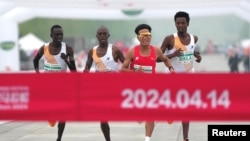Chinese long-distance runner He Jie is at the center of a controversy over his win in the Beijing Half Marathon, as organizers started a probe after a trio of African runners appeared to deliberately slow down so He could win the race.
A video clip circulating online shows that four athletes — Kenya’s Robert Keter and Willy Mnangat, Ethiopia’s Dejene Hailu Bikila and He — were approaching the finish line around the same time. Then, the three African athletes slowed down and gestured He to pass and take the lead.
The four athletes ran neck and neck just meters from the finish line, with He eventually crossing the tape first. The Chinese marathon record holder finished in 1 hour, 3 minutes, and 44 seconds. The African trio finished one second behind him at 1:03:45.
He, 25, won gold in the marathon at the 2023 Asian Games and is China's record holder.
When the video went viral, Mnangat first told the South China Morning Post that he “let China’s He Jie win” because “he is my friend.” He also said no one had told him to do so, nor had he been promised any monetary reward.
Six hours later, Mnangat changed his story, telling BBC Sport Africa that he “allowed He to win” because he was hired to serve as a “pacemaker” and he “was not there to compete.”
“It was not a competitive race for me,” he told the BBC. “I don’t know why they put my name on my bib/chest number instead of labeling it as a pacemaker.”
He added that his job was to set the pace and help He break the national record, which He did not achieve.
However, all three African athletes had entered the race as official competitors rather than as pacemakers. Mnangat’s Chinese agent, Karen Lin, said the issue had “nothing to do with me” and declined to comment further when approached by media.
The controversy has shocked Chinese observers, who are now questioning the fairness of the competition.
“It’s so fake. This is just too much!” one said on Weibo, China’s X-like social media platform.
“The Chinese sports scene give me chills,” another read.
Beijing Sports Bureau said it is now investigating the incident, adding that any results will be “promptly disclosed to the public.”
Mark Dreyer, an expert on China’s sports industry and the author of “Sporting Superpower: An Insider’s View on China’s Quest to Be the Best,” questioned the “pacemaker” explanation.
“So, if they really were pacemakers, as apparently is being claimed, why didn't they just say this originally? Why the need for a detailed investigation?” he posted on X.
He added that the “most obvious explanation here is that race fees for the Africans were guaranteed and/or a bonus was offered for letting local runner win.”
This is not the first time controversy has hit a marathon, as long-distance running has become a popular sport in China.
In 2019, four people were punished for cheating at the Shanghai International Marathon, including one who hopped on a bike.
In 2018, 258 people were caught on traffic cameras for taking shortcuts or hiring imposters to help complete the race at the Shenzhen Half Marathon.








